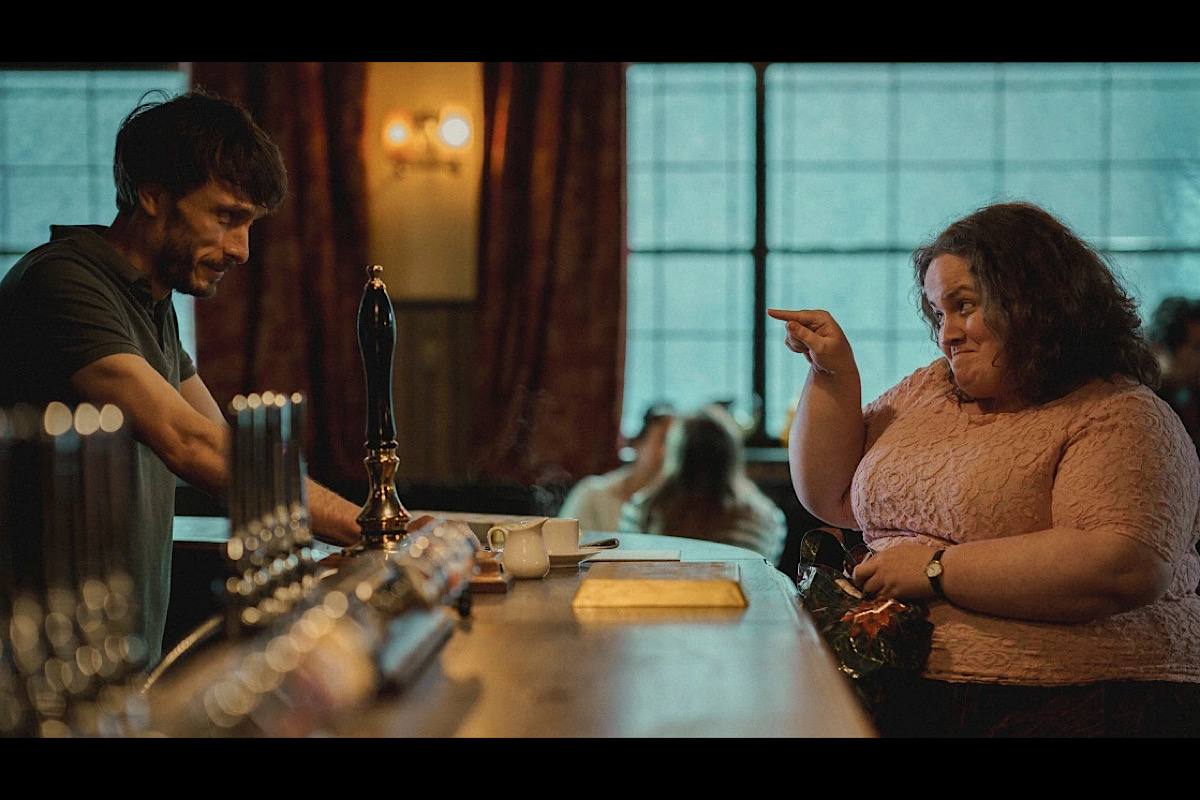Ever found yourself playing the role of a beverage-bearing Samaritan, thinking a simple cuppa could cure the blues, only to discover it’s the catalyst for a topsy-turvy tornado ripping through your life?
This is exactly where the story of Baby Reindeer on Netflix begins. The seven-episode autobiographical series catapults viewers into the escapades of Richard Gadd, who plays himself through a fictionalised version of his own self named Donny — an affable bartender and wannabe stand-up comedian — whose fateful offering of a cup of tea to a seemingly upset Martha Scott (portrayed by Jessica Gunning), sets off a chain reaction of obsession and chaos. What begins as a simple act of kindness swiftly morphs into a tangled web of infatuation, sealing Donny’s fate in a whirlwind of torment and turmoil as Martha’s visits to the pub transform into marathon sessions of one-sided conversations.
Martha may introduce herself as a lawyer, but her beverage budget (which is nil) seems to suggest she’s more of a lawbreaker. Despite claiming a busy schedule of client meetings, she’s got a knack for clocking in some serious overtime chatting up Donny at the bar. She has also invented a nickname for Donny – “baby reindeer”. As Donny realises he’s become the unwitting target of Martha’s fixation, the narrative plunges into a riveting exploration of their intertwining psyches.
From a plethora of emails and Facebook notifications to doorstep confrontations, Martha’s escalating obsession propels the story into darker territory, leaving Donny grappling with the consequences of his misplaced compassion. Yet, beneath the surface, lies a nuanced examination of vulnerability and reciprocity, blurring the lines between flattery and fear.
Caught in Martha’s relentless pursuit, Donny finds himself ensnared in a sinister game of cat and mouse, where every gesture of kindness only fuels her insatiable appetite for control. Donny discovers that Martha has a history of serial stalking and carries a criminal record. Despite holding an LLB degree, her past actions have barred her from practising law. Donny, however, for reasons unbeknownst to him, takes an entire period of six months to report her to the police.
But it’s not just a laundry list of heavy topics; Baby Reindeer forces you to confront uncomfortable truths and asks questions that stick to your brain like glue. Is Donny engaging with Martha out of genuine sympathy, or is he enjoying her affection towards him? Their initial banter may have the audience in stitches, but as the tension escalates, the laughter fades, leaving behind a palpable sense of discomfort.
Though trying to be a comedian, Donny’s performances often veer into the realm of the cringe-worthy and occasionally offensive. Additionally, his relationship with Teri, a transwoman (portrayed brilliantly by Nava Mau) is marred by deceit, and his discomfort with being seen with her hints at underlying transphobia. While Donny undoubtedly suffers as a victim of Martha’s obsession, it’s clear that he’s grappling with his own set of personal issues.
Soon, Baby Reindeer peels back the layers of Donny’s life like a particularly stubborn onion, and our initial assumptions start to feel as solid as a house of cards in a hurricane. With each revelation, Donny’s carefully constructed facade crumbles, revealing a heart-wrenching reality underneath. In a stroke of narrative genius, Gadd hits us with a flashback episode smack dab in the middle of the series, flipping our understanding of Donny on its head. Gone is the image of a struggling comedian stuck in a dead-end job; instead, we’re faced with a man haunted by the spectre of serious (read: sexual) abuse and crippled by self-loathing. Gadd masterfully lures us in with comedic moments in the first few episodes, only to pull the rug out from under us with this gut-wrenching revelation. While Martha’s stalking behaviour certainly contributes to Donny’s troubles, she’s not the primary antagonist in this twisted tale. That dubious honour falls squarely on Darrien (played by Tom Goodman-Hill), a rapist whose monstrous actions wreak havoc on Donny’s life and future aspirations.
The series, hence, transforms from serious to downright devastating. Donny’s recent breakups, his struggles with sexuality, and even his tumultuous relationship with Martha take on a whole new significance. It’s a soul-crushing experience to connect the dots of Donny’s life with the clarity of hindsight, and in doing so, Gadd proves himself a true master of storytelling.
Baby Reindeer isn’t just your run-of-the-mill production; it’s shot with the precision of a horror flick, leaving you with goosebumps and a nagging sense of unease. With uncomfortably close close-ups and angles that seem slightly askew, it’s like stepping into a house of mirrors where every reflection is a distortion of reality.
Gadd doesn’t shy away from the murky waters of morality, diving even deeper into the shades of grey. Among its many themes, the series tackles shame, cruelty and self-loathing, blending them with banter, ego and a hefty dose of pity.
At its core, the series delves into the complexities of human nature, challenging the simplistic notions of good and evil. Neither Martha nor Donny can be neatly categorised as purely virtuous or irredeemably wicked; instead, they struggle with their own demons in distinct ways. Martha’s fixation on Donny hints at deeper psychological issues, while Donny himself struggles with trauma and self-doubt. Teri, in her efforts to support Donny, exemplifies the limits of compassion and the strain it can place on even the most well-intentioned relationships. In this nuanced exploration of humanity’s shades of grey, the characters’ flaws and vulnerabilities are laid bare, highlighting the universal need for empathy and understanding.
Blurb: Gadd doesn’t shy away from the murky waters of morality, diving even deeper into the shades of grey. Among its many themes, the series tackles shame, cruelty and self-loathing, blending them with banter, ego and a hefty dose of pity.












